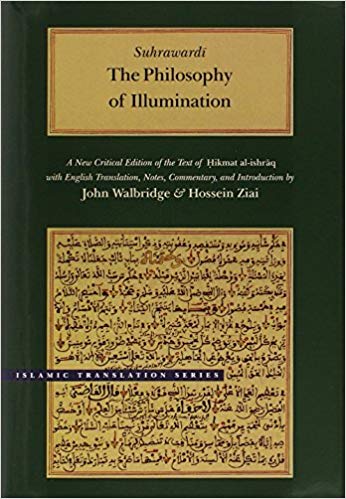
The Islamic Translation Series, which I launched and led at BYU, didn’t (of course) restrict itself to publishing works by the great al-Ghazali.
Here, for example, are two more volumes that we published early on, in, respectively, 2000 and 2001:
The Philosophy of Illumination, appeared in a dual-language edition that featured both the original Arabic and then, on the facing page, an English translation by John Wallbridge (of Indiana University) and Hossein Ziai (of the University of California at Los Angeles).
Here is the online description of the author and his book, which I believe that I wrote:
Shihab al-Din al-Suhrawardi was born around 1154, probably in northwestern Iran. Spurred by a dream in which Aristotle appeared to him, he rejected the Avicennan Peripatetic philosophy of his youth and undertook the task of reviving the philosophical tradition of the “Ancients.”
The two essays Decisive Treatise and Epistle Dedicatory appeared in their original Arabic, accompanied by a translation and a significant introductory essay by Charles Butterworth, a very distinguished scholar at the University of Maryland who was, at the time, the president of the Société Internationale d’Histoire des Sciences et de la Philosophie Arabes et Islamiques / International Society for the History of Arabic and Islamic Sciences and Philosophy.
Here is the online description of author and book, which I wrote:
Averroës (Ibn Rushd, 1126-1198) emerged from an eminent family in Muslim Spain to become the first and last great Aristotelian of the classical Islamic world; his meticulous commentaries influenced Christian thinkers and earned him favorable mention (and a relatively pleasant fate) in Dante’s Divina Commedia. The Book of the Decisive Treatise was and remains one his most important works and one of history’s best defenses of the legitimate role of reason in a community of faith. The text presents itself as a plea before a tribunal in which the divinely revealed Law of Islam is the sole authority; Averroës, critical of the anti-philosophical tone of the Islamic establishment, argues that the Law not only permits but also mandates the study of philosophy and syllogistic or logical reasoning, defending earlier Muslim philosophers and dismissing criticisms of them as more harmful to the Islamic community than the philosophers’ own views had been. As he details the three fundamental methods the Law uses to aid people of varied capacities and temperaments, Averroës reveals a carefully formed and remarkably argued conception of the boundaries and uses of faith and reason.











